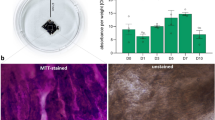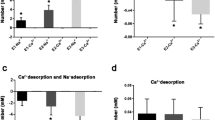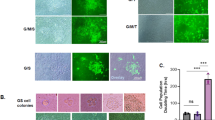Abstract
INADEQUATE functional ‘survival’ of hearts cultured in supernatant containing serum with a high potassium-level from lysed red cells led us to investigate the effects of supernatant potassium-levels on the electrical activity of 1,222 hearts in quantitative tissue culture. The criterion for ‘adequate survival’ is an ability to produce potentials of at least 0.02 mV. during a minimum of three periods of observation per day (8 a.m., 1 p.m. and 5 p.m.). The apparatus, etc., is described in previous papers1. The supernatants are 0.25 per cent solutions of human serum protein in balanced salt solutions—however, they differ in potassium-level. The ‘adequate survival’ time is given to the nearest day using the smallest figure in cases of doubt.
This is a preview of subscription content, access via your institution
Access options
Subscribe to this journal
Receive 51 print issues and online access
$199.00 per year
only $3.90 per issue
Buy this article
- Purchase on SpringerLink
- Instant access to full article PDF
Prices may be subject to local taxes which are calculated during checkout
Similar content being viewed by others
References
Cunningham and Estborn, Lab. Invest., 7, 156 (1958). Estborn, Cunningham et al., ibid., 7, 524 (1958).
Author information
Authors and Affiliations
Rights and permissions
About this article
Cite this article
CUNNINGHAM, A., KLEUTCH, K. & HERBST, W. Effect of Supernatant Potassium-Level on Cardiac Activity in Quantitative Tissue Culture. Nature 186, 241–242 (1960). https://doi.org/10.1038/186241b0
Issue date:
DOI: https://doi.org/10.1038/186241b0



